Related Research Articles
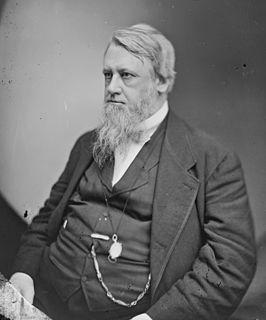
Henry Bowen Anthony was a United States newspaperman and political figure. He served as editor and was later part owner of the Providence Journal. He was the 21st Governor of Rhode Island, serving between 1849 and 1851 as a member of the Whig Party. Near the end of the 1850s, he was elected to the Senate by the Rhode Island Legislature and was re-elected 4 times. He would be twice elected to the Senate's highest post as President pro tempore during the Grant administration, and served until his death in 1884.

Samuel Gorton (1593–1677) was an early settler and civic leader of the Colony of Rhode Island and Providence Plantations and President of the towns of Providence and Warwick. He had strong religious beliefs which differed from Puritan theology and was very outspoken, and he became the leader of a small sect of converts known as Gortonists or Gortonites. As a result, he was frequently in trouble with the civil and church authorities in the New England colonies.
George Washington Greene was an American historian. He was also the grandson of Major-General Nathanael Greene, a hero of the American Revolutionary War.
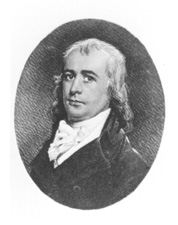
Ray Greene was a United States Senator and Attorney General from Rhode Island during the early days of statehood.

Charles Collins Van Zandt was the 34th Governor of Rhode Island.

Benedict Arnold was president and then governor of the Colony of Rhode Island and Providence Plantations, serving for a total of 11 years in these roles. He was born and raised in the town of Ilchester, Somerset, England, likely attending school in Limington nearby. In 1635 at age 19, he accompanied his parents, siblings, and other family members on a voyage from England to New England where they first settled in Hingham in the Massachusetts Bay Colony. In less than a year, they moved to Providence Plantation at the head of the Narragansett Bay at the request of Roger Williams. In about 1638, they moved once again about five miles (8 km) south to the Pawtuxet River, settling on the north side at a place commonly called Pawtuxet. Here they had serious disputes with their neighbors, particularly Samuel Gorton, and they put themselves and their lands under the jurisdiction of Massachusetts, a situation which lasted for 16 years.
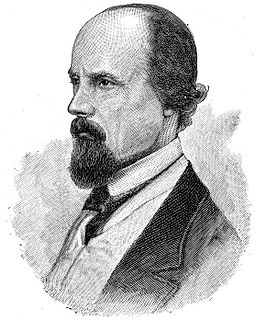
George Henry Calvert was an American editor, essayist, dramatist, poet, and biographer. He was the Chair of Moral Philosophy at the newly established College of Arts and Sciences at the University of Baltimore, and in 1854 he served as Mayor of Newport, Rhode Island.
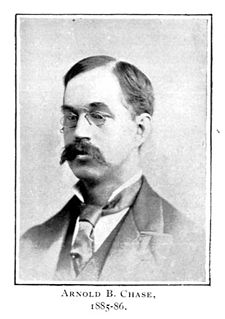
Arnold Buffum Chace was an American textile businessman, mathematics scholar, and eleventh chancellor of Brown University in Providence, Rhode Island.
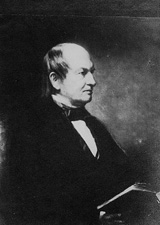
Albert Collins Greene was an American lawyer and politician from Rhode Island. He served as a United States Senator and Attorney General of Rhode Island.

Franklin J. Dickman was a Republican politician in the U.S. State of Ohio who was in the Ohio House of Representatives and was an Ohio Supreme Court Judge 1886–1895.
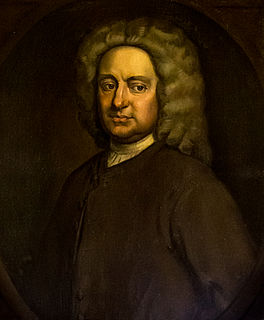
William Greene Sr. was a governor of the Colony of Rhode Island and Providence Plantations. He was a clerk of the county court in Providence, deputy from Warwick, speaker of the Rhode Island Assembly, and then deputy governor from 1740 to 1743. He became governor for the first time in 1743 and served four separate terms for a total of 11 years, and died while in office during his final term.
John Greene Jr. was a deputy governor of the Colony of Rhode Island and Providence Plantations who spent almost his entire adult life in the public service of the colony. Born in England, he was the son of John Greene Sr. and Joan Tattersall, and sailed to New England with his parents in 1635 aboard the ship James. His father, after coming from Massachusetts to Providence, became one of the original settlers of Warwick. In 1652 Greene served in his first public role as a commissioner from Warwick, and served in some public capacity every year until 1690 when he was first chosen as deputy governor of the colony. He then served 10 consecutive one-year terms in this capacity, retiring from public service in 1700 at the age of 80. He was one of the 10 Assistants named in the Royal Charter of 1663, which would become the basis for Rhode Island's government for nearly two centuries. During the devastating events of King Phillips War, Greene was one of 16 prominent inhabitants of the colony whose counsel was sought by the General Assembly.
John Greene Sr. was an early settler of the Colony of Rhode Island and Providence Plantations, one of the 12 original proprietors of Providence, and a co-founder of the town of Warwick in the colony, sailing from England with his family in 1635. He first settled in Salem in the Massachusetts Bay Colony, but he had difficulty with the Puritan authority and soon followed Roger Williams to Providence, becoming one of the original proprietors of that town. In 1643, he joined Samuel Gorton and ten others in purchasing land that became the town of Warwick. Difficulties with Massachusetts ensued, until he accompanied Gorton on a trip to England where they secured royal recognition of their town.
Randall Holden was an early inhabitant of the Colony of Rhode Island and Providence Plantations, one of the original founders of Portsmouth, and one of the co-founders of the town of Warwick. He came to New England from Salisbury, Wiltshire, England and is first recorded as one of the signers of the Portsmouth Compact. Following a few years on Aquidneck Island, he joined Samuel Gorton and ten others to establish the town of Warwick in early 1643 on land purchased from the Indian sachems.

William Greene Jr. was the second governor of the state of Rhode Island, serving in this capacity for eight years, five of which were during the American Revolutionary War. From a prominent Rhode Island family, his father, William Greene Sr., had served 11 terms as a colonial governor of Rhode Island. His great-grandfather, John Greene Jr. served for ten years as deputy governor of the colony, and his great-great-grandfather, John Greene Sr. was a founding settler of both Providence and Warwick.

William Greene III was a lieutenant governor of the state of Rhode Island, serving for two years shortly after the American Civil War.

Pardon Elisha Tillinghast was a Justice of the Rhode Island Supreme Court from 1891 to 1905, serving as Chief Justice from 1904 until his death.
Robert Coles was a 17th-century New England colonist who is known for the scarlet-letter punishment he received in the Massachusetts Bay Colony and his role in establishing the Providence Plantations, now the state of Rhode Island.
Wayland Wilbur Rice was a businessman and chemical engineer, and the Vice President and Secretary of the Barreled Sunlight Paint Company in Providence, Rhode Island.
References
- 1 2 3 Drake, F. S., Dictionary of American biography, 1870
- ↑ The biographical cyclopedia of representative men of Rhode Island, 1881
- 1 2 Appleton's Cyclopaedia of American biography, 6 vols, 1888
- ↑ The national cyclopaedia of American biography, 13 vols, 1898.
- ↑ Louise Brownell Clarke, The Greenes of Rhode Island, with Historical Records of English Ancestry, 1534-1902, Complied from the Mss. of Major-General George Sears Greene, U. S. V. (New York: Knickerbocker Press, 1903)